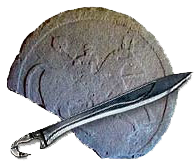Autor: Mazout
viernes, 16 de mayo de 2008
Sección: Toponimia
Información publicada por: mazout
Mostrado 10.288 veces.
Topónimos Vascos Indoeuropeos
Debido a que la sabiduría del grupo desaconseja este artículo, no está disponible.
No hay imágenes relacionadas.
Comentarios
 Pulsa este icono si opinas que la información está fuera de lugar, no tiene rigor o es de nulo interés.
Pulsa este icono si opinas que la información está fuera de lugar, no tiene rigor o es de nulo interés.
Tu único clic no la borarrá, pero contribuirá a que la sabiduría del grupo pueda funcionar correctamente.
Si te registras como usuario, podrás añadir comentarios a este artículo.

Datos tomados de Diccionario etimológico McBains (CEANTAR)
http://www.ceantar.org/Dicts/MB2/index.html
1. ZUB/ZAB
sòbhaidh, sò''aidh
turn, prevent, Old Irish sóim, inF. sood, root sov, discussed under iompaidh.
2. ITE/ITIA
àite
a place, Irish, Early Irish áit. Possibly Celtic po@-d-ti, *panti? root po@-d, ped, Latin oppidum, Greek @Gpédon, ground, Sanskrit padám, place; as in eadh, q.v. Stokes has referred áit to the root that appears in German ort, place, Norse oddr, Old English ord, point, Teutonic uzd-, Indo-European uzdh-; but this in Gaelic would give ud or od.
3. ARTE
àrd
high, Irish, Early Irish ârd, Gaulish Ardvenna; Latin arduus; Greek @Go@''rqós
ALDE
ailt
stately, high; Irish ailt, Latin
altus
, àilt (H.S.D.).
LAZ/LEZ
làthach
mire, clay, Irish, Early Irish lathach, coenum, Welsh llaid, mire, Breton leiz, moist: *latákâ, *latjo-, root lat, be moist; Greek @Glátax, @Glátagés, drops; Latin latex, liquid.
LUCE
lùth
strength, pith, Irish lúth, Early Irish lúth; cF. Old Irish lúth, velocity, motion, from the root pleu, plu of luath. Or tlúth, from tel?
LUR
làr
the ground, Irish, Old Irish lár, Welsh llawr, Old Cornish lor, Old Breton laur, solum, Breton leur: *lâro-, *plâro; English floor, Anglo-Saxon flór, Norse flór, German flur; root plâ, broad, broaden, Latin plânus, English plain, etc.
ORDO
òrd
a mountain of rounded form (topographical only); from òrd.
òrd
a hammer, Irish, Middle Irish ord, Old Irish ordd, Welsh gordd, Old Cornish ord, Breton orz, horz, Gallo. Brit. Ordo-vices(?): *ordo-s, *urdo-s, root verdh, urdh, raise, increase, whence or allied are Greek @Go@''rqós, Latin arduus, Gaelic àrd, etc.; especially Sanskrit vardhate, raise, increase, grow. See òrdag. Thurneysen thinks it perhaps possible that Romance urtare, hit, thrust, French heurter, English hurt, are hence, and Ascoli that French ortail, big toe (orddu = ortu), is from òrd, the basis of òrdag, q.v.
corte2.
(Del lat. cors, cortis, o cohors, cohortis, cohorte).
6. F. Corral o establo donde se recoge de noche el ganado.
7. F. Aprisco donde se encierran las ovejas.
¿En vasco tiene el mismo origen?
Hay 3 comentarios.
1